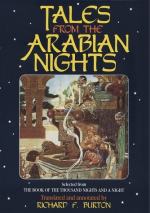The king gathered together the horses and the spoil, and returned to town, much vexed that his sons-in-law had done nothing. Then the youngest princess asked her mother to send for her father to look at the ring and the handkerchief, when he fell down and kissed the feet of Mohammed, who rose up giddy from sleep, but when he was asked his history, he answered, “I am a prince like yourself, and your six sons-in-law are mamelouks of my father. I beat them, and they took to flight, and through fear of my father, I set out in search of them. I came here and found that they were your sons-in-law, but I imposed silence on them. But as regards your daughter, she saw me in the garden, and recognised my real rank; here is your daughter, O king; she is still a virgin.” Then the wedding was celebrated with great pomp, and Mohammed remained with his father-in-law for some time, until he desired to return to his own country. On his arrival he found that his father had died, so he ascended the throne, and ordered his mother-in-law and the Jew to be burned.
Carlo de Landberg, Basim le Forgeron et Haron Er-Rachid, 8vo., Leyden, 1888.
Text and translation of a modern Arabic story of an unfortunate smith and hashish-eater whom Harun encounters on one of his usual nocturnal rambles. Harun plays a succession of practical jokes on him, driving him out of his employment every day, and supping with him every night. At last he bastinadoes him, and throws him into prison, where a jinniyah takes pity on him, and confers unlimited power on him, which he enjoys for a week, and then dies, to the great grief of Harun.
Additional Note to Suppl. Vol. V. (Pp. 318-320).
Compare Boccaccio’s story of the Devil in Hell (Day iii. No. 11).
The Biography of the Book
and
Its Reviewers Reviewed.
[” It has occurred to me that perhaps it would be a good plan to put a set of notes . . . to the ‘Origin,’ which now has none, exclusively devoted to the errors of my reviewers. It has occurred to me that where a reviewer has erred a common reader might err. Secondly, it will show the reader that we must not trust implicitly to reviewers.”—DARWIN’S life. ii. 349.]
TO RICHARD FRANCIS BURTON.
The Thousand Nights and a Night.
Athwart the welkin slant
the snows and pile
On
sill and balcony, their feathery feet
Trip
o’er the landscape, and pursuing sleet
Earth’s brow beglooming,
robs the skies of smile:
Lies in her mourning-shroud
our Northern Isle
And
bitter winds in battle o’er her meet.
Her
world is death-like, when behold! we greet
Light-gleams from morning-land
in welcome while.
A light of golden mine
and orient pearl—
Vistas
of fairy-land, where Beauty reigns
And
Valiance revels; cloudless moon, fierce sun,
The wold, the palm-tree;
cities; hosts; a whirl
Of
life in tents and palaces and fanes:
The
light that streams from thousand nights and
one.




